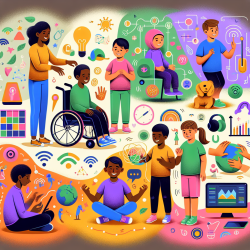Empowering Youth for Healthier Futures: Transforming Lives Through Evidence-Based Interventions
In the realm of speech-language pathology, practitioners are often focused on communication and cognitive development. However, the broader context of a child's health and well-being cannot be ignored. A recent study titled "Reducing Sugary Drink Intake Through Youth Empowerment: Results from a Pilot-Site Randomized Study" offers valuable insights that can be applied to our practice. This study highlights the potential of youth empowerment in reducing sugar-sweetened beverage (SSB) consumption and improving health outcomes among children.
The Power of Youth Empowerment
The study conducted a community-based intervention named H2GO! in Massachusetts, targeting children aged 9-12 years. The intervention was designed to empower youth by involving them in activities that promote healthier beverage choices, specifically reducing SSB intake and increasing water consumption. The results were promising, showing significant reductions in SSB consumption and improvements in body mass index (BMI) among participants.
For practitioners in speech-language pathology, this approach underscores the importance of considering the whole child. Empowerment-based strategies can be integrated into therapy sessions to foster autonomy and decision-making skills, which are crucial for both communication and overall health.
Data-Driven Insights for Practitioners
The study's data-driven approach provides a blueprint for practitioners looking to incorporate similar strategies into their practice. Here are some key takeaways:
- Empowerment Through Education: Educating children about the impact of their choices on health can lead to meaningful behavior change. Incorporate educational activities that align with therapy goals.
- Parental Involvement: Engaging parents in the intervention process enhances the likelihood of success. Encourage parents to model healthy behaviors and create supportive home environments.
- Community-Based Interventions: Leveraging community resources, such as after-school programs, can extend the reach and impact of interventions. Collaborate with local organizations to support holistic child development.
Encouraging Further Research
While the study provides a solid foundation, further research is needed to explore the long-term effects of youth empowerment interventions on health and communication outcomes. Practitioners are encouraged to contribute to this growing body of research by implementing and evaluating similar interventions in their practice.
By adopting a data-driven approach and focusing on empowerment, speech-language pathologists can play a pivotal role in promoting healthier lifestyles and communication skills among children. This holistic approach not only benefits individual children but also contributes to the well-being of communities.
To read the original research paper, please follow this link: Reducing sugary drink intake through youth empowerment: results from a pilot-site randomized study.










